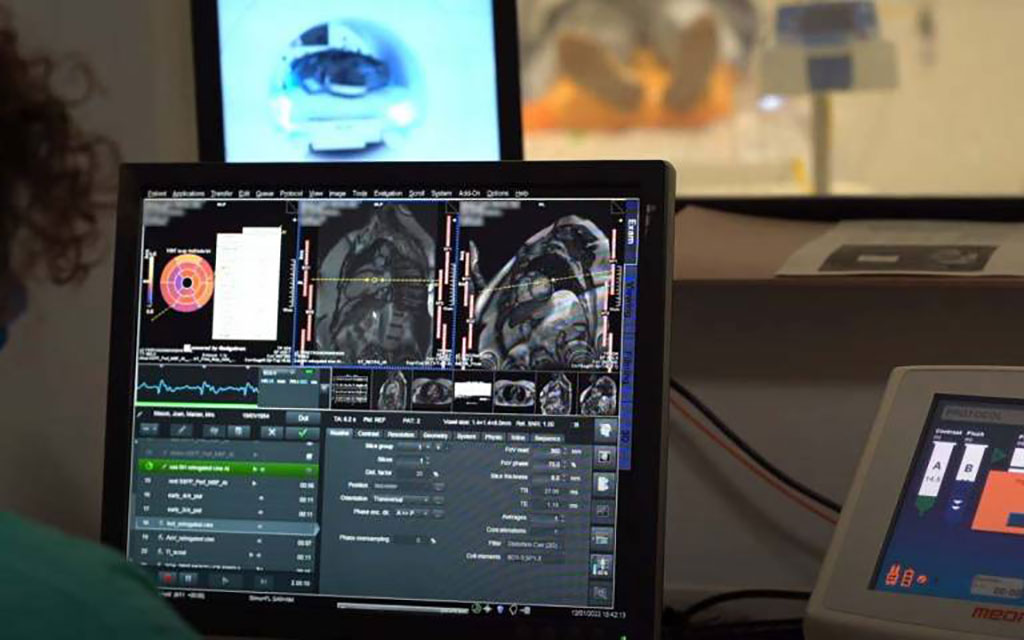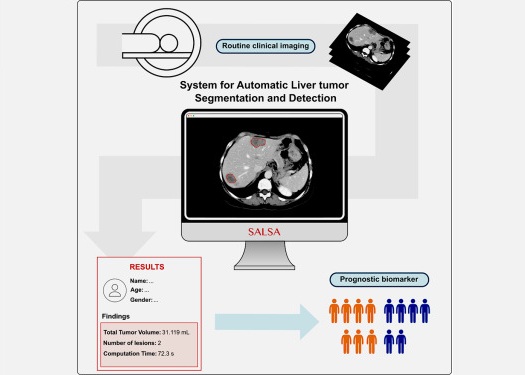First-of-Its-Kind AI Tool Analyzes Heart MRI Scans in Just 20 Seconds
|
By MedImaging International staff writers Posted on 18 Mar 2022 |

A new artificial intelligence (AI) tool can be used to detect heart disease in record speed, helping to improve care for heart patients.
The first-of-its-kind AI tool, developed by a team of scientists and cardiologists at University College London (UCL, London, UK) analyses heart MRI scans in just 20 seconds whilst the patient is in the scanner. This compares to the 13 minutes or more it would take for a doctor to manually analyze the images after the MRI scan has been performed. It also detects changes to the heart structure and function with 40% greater precision and extracts more information than a human can.
The team trained the AI to measure the size of the left ventricle (the main pumping chamber of the heart), the thickness of the heart muscle and how well the left ventricle was able to pump blood around the body. They did this using heart MRI scans from 1,923 people - including people with seven different heart conditions at 13 different hospitals and using 10 different models of MRI scanner. The AI was then validated on a further 109 patients who were scanned twice. They found that the AI technology analyzed heart MRI scans more precisely than three doctors, removing the issue of subjectivity with human analysis.
The technology will improve diagnosis and treatment for a multitude of heart conditions. It is designed to diagnose a new heart condition when someone is first assessed for heart disease. It can spot early signs of heart disease - such as after having chemotherapy - which in some cases can cause damage to the heart, and it has the potential to screen for heart conditions in people with a family history of heart disease. The tool also helps doctors to see how patients with heart conditions are responding to their treatment, so they can then make any necessary adjustments.
According to the researchers, the AI will free-up valuable time of healthcare professionals so that their attention can be directed to seeing more patients on waiting lists, which will ultimately help with the backlog in vital heart care. The AI will also give patients and doctors more confidence in the results so that they can make better decisions about a person’s treatment and possible surgeries.
“Our new AI reads complex heart scans in record speed, analyzing the structure and function of a patient’s heart with more precision than ever before. The beauty of the technology is that it replaces the need for a doctor to spend countless hours analyzing the scans by hand,” said Dr. Rhodri Davies (UCL Institute of Cardiovascular Science and Barts Heart Centre at St Bartholomew’s Hospital), who was the study’s lead author. “We are continually pushing the technology to ensure it’s the best it can be, so that it can work for any patient with any heart disease.”
“This is a huge advance for doctors and patients, which is revolutionizing the way we can analyze a person’s heart MRI images to determine if they have heart disease at greater speed,” said Dr. Sonya Babu-Narayan, Associate Medical Director at the British Heart Foundation and Consultant Cardiologist. “The pandemic has resulted in a backlog of hundreds of thousands of people waiting for vital heart scans, treatment and care. Despite the delay in cardiac care, whilst people remain on waiting lists, they risk avoidable disability and death. That’s why it’s heartening to see innovations like this, which together could help fast-track heart diagnoses and ease workload.”
Related Links:
University College London
Latest MRI News
- New MRI Technique Reveals True Heart Age to Prevent Attacks and Strokes
- AI Tool Predicts Relapse of Pediatric Brain Cancer from Brain MRI Scans
- AI Tool Tracks Effectiveness of Multiple Sclerosis Treatments Using Brain MRI Scans
- Ultra-Powerful MRI Scans Enable Life-Changing Surgery in Treatment-Resistant Epileptic Patients
- AI-Powered MRI Technology Improves Parkinson’s Diagnoses
- Biparametric MRI Combined with AI Enhances Detection of Clinically Significant Prostate Cancer
- First-Of-Its-Kind AI-Driven Brain Imaging Platform to Better Guide Stroke Treatment Options
- New Model Improves Comparison of MRIs Taken at Different Institutions
- Groundbreaking New Scanner Sees 'Previously Undetectable' Cancer Spread
- First-Of-Its-Kind Tool Analyzes MRI Scans to Measure Brain Aging
- AI-Enhanced MRI Images Make Cancerous Breast Tissue Glow
- AI Model Automatically Segments MRI Images
- New Research Supports Routine Brain MRI Screening in Asymptomatic Late-Stage Breast Cancer Patients
- Revolutionary Portable Device Performs Rapid MRI-Based Stroke Imaging at Patient's Bedside
- AI Predicts After-Effects of Brain Tumor Surgery from MRI Scans
- MRI-First Strategy for Prostate Cancer Detection Proven Safe
Channels
Radiography
view channel
AI Improves Early Detection of Interval Breast Cancers
Interval breast cancers, which occur between routine screenings, are easier to treat when detected earlier. Early detection can reduce the need for aggressive treatments and improve the chances of better outcomes.... Read more
World's Largest Class Single Crystal Diamond Radiation Detector Opens New Possibilities for Diagnostic Imaging
Diamonds possess ideal physical properties for radiation detection, such as exceptional thermal and chemical stability along with a quick response time. Made of carbon with an atomic number of six, diamonds... Read moreUltrasound
view channel.jpeg)
AI-Powered Lung Ultrasound Outperforms Human Experts in Tuberculosis Diagnosis
Despite global declines in tuberculosis (TB) rates in previous years, the incidence of TB rose by 4.6% from 2020 to 2023. Early screening and rapid diagnosis are essential elements of the World Health... Read more
AI Identifies Heart Valve Disease from Common Imaging Test
Tricuspid regurgitation is a condition where the heart's tricuspid valve does not close completely during contraction, leading to backward blood flow, which can result in heart failure. A new artificial... Read moreNuclear Medicine
view channel
Novel Radiolabeled Antibody Improves Diagnosis and Treatment of Solid Tumors
Interleukin-13 receptor α-2 (IL13Rα2) is a cell surface receptor commonly found in solid tumors such as glioblastoma, melanoma, and breast cancer. It is minimally expressed in normal tissues, making it... Read more
Novel PET Imaging Approach Offers Never-Before-Seen View of Neuroinflammation
COX-2, an enzyme that plays a key role in brain inflammation, can be significantly upregulated by inflammatory stimuli and neuroexcitation. Researchers suggest that COX-2 density in the brain could serve... Read moreGeneral/Advanced Imaging
view channel
CT-Based Deep Learning-Driven Tool to Enhance Liver Cancer Diagnosis
Medical imaging, such as computed tomography (CT) scans, plays a crucial role in oncology, offering essential data for cancer detection, treatment planning, and monitoring of response to therapies.... Read more
AI-Powered Imaging System Improves Lung Cancer Diagnosis
Given the need to detect lung cancer at earlier stages, there is an increasing need for a definitive diagnostic pathway for patients with suspicious pulmonary nodules. However, obtaining tissue samples... Read moreImaging IT
view channel
New Google Cloud Medical Imaging Suite Makes Imaging Healthcare Data More Accessible
Medical imaging is a critical tool used to diagnose patients, and there are billions of medical images scanned globally each year. Imaging data accounts for about 90% of all healthcare data1 and, until... Read more
Global AI in Medical Diagnostics Market to Be Driven by Demand for Image Recognition in Radiology
The global artificial intelligence (AI) in medical diagnostics market is expanding with early disease detection being one of its key applications and image recognition becoming a compelling consumer proposition... Read moreIndustry News
view channel
GE HealthCare and NVIDIA Collaboration to Reimagine Diagnostic Imaging
GE HealthCare (Chicago, IL, USA) has entered into a collaboration with NVIDIA (Santa Clara, CA, USA), expanding the existing relationship between the two companies to focus on pioneering innovation in... Read more
Patient-Specific 3D-Printed Phantoms Transform CT Imaging
New research has highlighted how anatomically precise, patient-specific 3D-printed phantoms are proving to be scalable, cost-effective, and efficient tools in the development of new CT scan algorithms... Read more
Siemens and Sectra Collaborate on Enhancing Radiology Workflows
Siemens Healthineers (Forchheim, Germany) and Sectra (Linköping, Sweden) have entered into a collaboration aimed at enhancing radiologists' diagnostic capabilities and, in turn, improving patient care... Read more





















